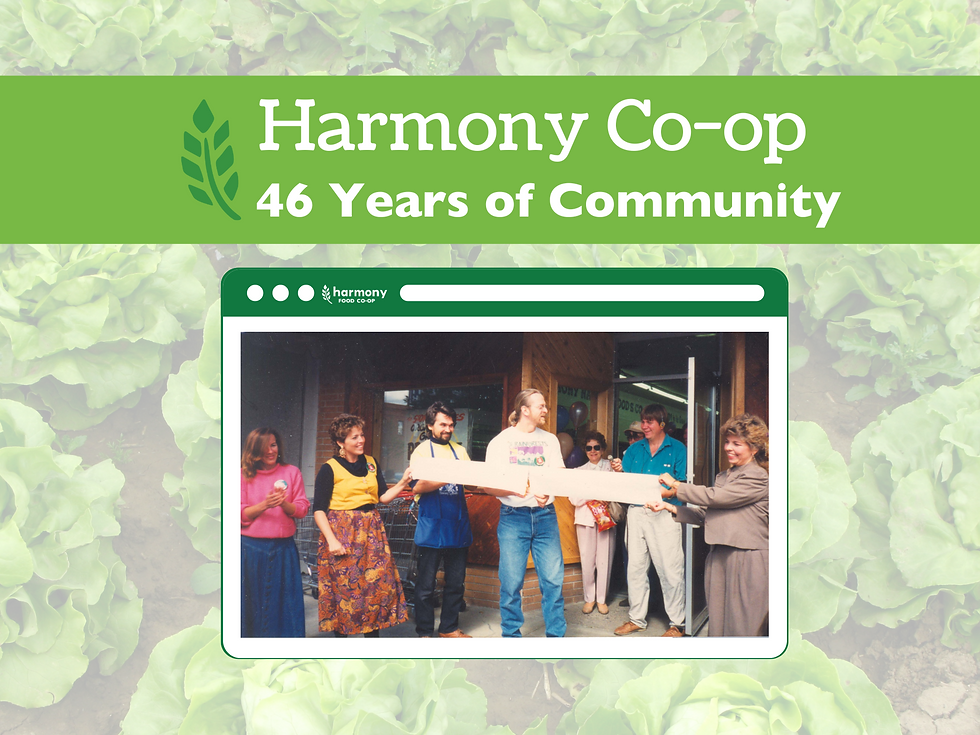...A Way of Life
- Linda Snell
- Apr 16, 2019
- 3 min read

About two years ago, Harmony Foods relocated to the upstairs of an old church on the corner of Eighth Street and Beltrami Avenue. The first seeds of the co-operative sprouted in a building which is now the Paul Bunyan Submarine Shop.
Mark Strand was one of the original people involved in the carryout of the idea of the co-operative, and the store was often called “Mark’s Co-op”. He is now one of the two coordinators. Including a few original members, the Board of Directors makes final decisions for the co-op, and is selected from present members every six months. Financial concerns, day-to-day business, and ordering are completed by the two coordinators.
At the first step in the door, one can see this is a casual place to shop. Usually, a few working patrons are inside working off their hours required for membership. Acknowledgements are made between familiar faces and small talk is shared between the new and old customers. Opposite the counter on a bulletin board are advertisements, needs, announcements of organizational meetings, lands for sale, things to be bought, and things to be sold. The list includes services offered by a registered reflexologist, lessons in Spanish, programs of the Northwoods Audubon Center, a Wildlife Refuge for sale, a course in natural healing, weddings performed by Rev. Victoria DeMars, a buck goat for sale, and a tenant hotline number posted for the “tenant blues”.
“It’s a store for the whole family,” said Pam, listening to a baby’s cries as the mother chose her purchases. Later, another customer filled the counter with his items of honey, peanut butter, alfalfa seeds, and grains. Before Pam finished totaling the list, a few candy bars were added. When the question of the nutrition of candy bars came up, Pam smiled and called it “healthy junk food”.
It seems not to matter to the people behind the check-out counter at Harmony Foods Co-operative if someone has come to buy or just to browse. What matters is the idea one has seen behind the co-operative—the idea of people working together, a way to live.
Hung on the wall above the check-out counter is a poster of a grey-and-white seagull against a blue sky with this quote: “Peace cannot be kept by force, but only made by understanding.” This seems to fit in with the philosophy of the Harmony Foods Co-operative. Harmony is evident within the doors of the store. There is a relaxed, peaceful atmosphere, and no rush to gather up one’s purchases and leave with the sales slip.
Lining several rows of shelves are jars of spices and teas. On the opposite side of the room are more shelves of various organic grains (rices, flours, wheats, and oats), legumes, seeds, and nuts. Besides these whole foods, Harmony Foods also sells dairy products such as eggs, yogurt, cheeses, kefir (cultured milk) and tofu (soybean curd). An enzyme called miso (fermented soybean paste), cashew butter, carob chips (a chocolate substitute containing no sugar), honey, molasses, peanut butter, juices, and lecithin (a granulated powder which breaks up the body’s fatty acids) are sold in the store.
Toothpaste, skin lotion, T-shirts, pottery, incense, cookbooks, and sponges are to be fund on tables in the middle of the single room. Freely given advice in the form of wall posters instruct customer on the sprouting of alfalfa, mung, or bean seeds, and “27 Ways to Use Wheat Germ”. An idea book and recipe box resting on the counter by the door invites anyone’s interest and additions. A library loan system offers the use of any books which fill the bookshelves.
The co-operatives’ customers aren’t just purchasing some of the store’s supplies when they climb up the wooden stairs to the single-room store. They are also viewing an idea. Pam Koepplinger, a coordinator of Harmony Foods explains, “the idea behind a co-op is that it is a co-operative; a way of life, and especially dealing with foods. The way the world’s going now, we need to work together.”
Harmony Foods is a co-operative organization made up of a variety of people. “A lot of people who belong are homesteaders,” said Pam. She defined homesteaders as people living in the backwoods and building their own homes, but also included a number of members as being students and elderly customers.
The membership policy involves the customer as a worker in the store and unites customer and co-operative. The working patron earns his/her discount of 20 percent by contributing two hours of their time in the store per month, besides a five dollar fee each year. A worker’s duties include bagging, stocking, pricing and labeling the store’s supplies, watering the plants, and sweeping floors. New orders are purchased from the Common Health Warehouse in Duluth and from individuals in the area.



Comments